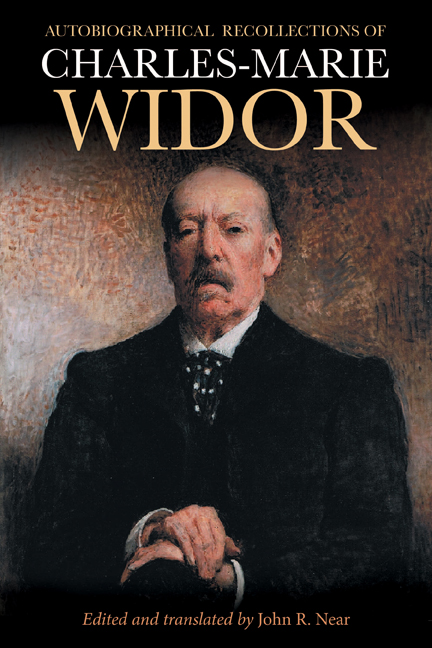Book contents
- Frontmatter
- Contents
- List of Illustrations
- Foreword
- Preface
- Acknowledgments
- Introduction: Tribute to Charles-Marie Widor
- Part One Studies, Early Performances, and Aristide Cavaillé-Coll (1844–69)
- Part Two La Belle Époque: The Franco-Prussian War to The Great War (1870–1914)
- Part Three The Great War and Important Initiatives (1914–37)
- Appendix 1 Birth record of Charles-Marie Widor, 1844
- Appendix 2 Widor’s Diplôme de Bachelier ès Lettres, 1863
- Appendix 3 Widor’s letter of appreciation to Jacques Lemmens, 1863
- Appendix 4 Brussels Ducal Palace organ specification, 1861
- Appendix 5 Widor’s certificate for Chevalier de l’Ordre du Christ, 1866
- Appendix 6 “To Budapest,” 1893
- Appendix 7 Widor’s travels to Russia and his 1903 passport
- Appendix 8 Widor’s list of his works in 1894
- Appendix 9 The Paris Conservatory organs, 1872
- Appendix 10 Chronique [Widor’s appeal for an organ hall at the Paris Conservatory, 1895]
- Appendix 11 Widor’s certificate for the Académie Royale, Brussels, 1908
- Appendix 12 “Debussy & Rodin,” 1927
- Appendix 13 The American Conservatory organ, Fontainebleau, 1925
- Appendix 14 Letters concerning the Trocadéro organ restoration, 1926
- Notes
- Bibliography
- Index
- Eastman Studies in Music
46 - Life at the Standishes
Published online by Cambridge University Press: 09 May 2024
- Frontmatter
- Contents
- List of Illustrations
- Foreword
- Preface
- Acknowledgments
- Introduction: Tribute to Charles-Marie Widor
- Part One Studies, Early Performances, and Aristide Cavaillé-Coll (1844–69)
- Part Two La Belle Époque: The Franco-Prussian War to The Great War (1870–1914)
- Part Three The Great War and Important Initiatives (1914–37)
- Appendix 1 Birth record of Charles-Marie Widor, 1844
- Appendix 2 Widor’s Diplôme de Bachelier ès Lettres, 1863
- Appendix 3 Widor’s letter of appreciation to Jacques Lemmens, 1863
- Appendix 4 Brussels Ducal Palace organ specification, 1861
- Appendix 5 Widor’s certificate for Chevalier de l’Ordre du Christ, 1866
- Appendix 6 “To Budapest,” 1893
- Appendix 7 Widor’s travels to Russia and his 1903 passport
- Appendix 8 Widor’s list of his works in 1894
- Appendix 9 The Paris Conservatory organs, 1872
- Appendix 10 Chronique [Widor’s appeal for an organ hall at the Paris Conservatory, 1895]
- Appendix 11 Widor’s certificate for the Académie Royale, Brussels, 1908
- Appendix 12 “Debussy & Rodin,” 1927
- Appendix 13 The American Conservatory organ, Fontainebleau, 1925
- Appendix 14 Letters concerning the Trocadéro organ restoration, 1926
- Notes
- Bibliography
- Index
- Eastman Studies in Music
Summary
When he came to Paris, King Edward VII always came to dine here at the home of Mme Hélène Standish, née des Cars. These intimate dinners were always attended by the same guests: the King, the Queen [Alexandra], the King's orderly, the Queen's lady-in-waiting, and always the same three French guests: Victorien Sardou, who represented the Académie des Inscriptions et Belles-Lettres; Édouard Detaille, the Académie des Beaux-Arts, for the painting section; and me, for the music section.
While King Edward VII's sister Princess Christian accepted the hospitality of Baroness d’Erlanger on Avenue Kléber every year, King George V's sister Princess Victoria came here like family. She was very fond of the arts, and I felt very honored to be her escort. For instance, I gladly accompanied her to the theater to see new plays. But one day she said to me: “Instead of going to the theater, would you let me hear the organ at Saint-Sulpice? I’m a little tired of the theater, but what I would especially like is to hear Saint-Sulpice all to myself, in the evening, in the dimly lit church. Is it possible?” Naturally, I said to her: “All alone is a bit difficult because it's impossible for me not to alert the parish priest who would find it very bad not to be informed.” —“Okay! that goes without saying,” she replied. So it was arranged for the next day. The priest told me of his emotion in front of this woman kneeling with her head in her hands, in the full mysticism of this sound wave—the voice of the organ that, if it has a beginning, can have no end, and, by the idea of the infinite, gives us the idea of eternity.
- Type
- Chapter
- Information
- Publisher: Boydell & BrewerPrint publication year: 2024

